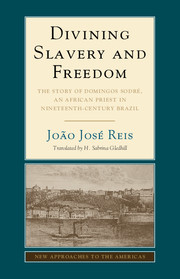 Divining Slavery and Freedom
Divining Slavery and Freedom Book contents
- Frontmatter
- Dedication
- Contents
- Preface
- Abbreviations
- Map
- 1 Cops and Candomblé in Domingos Sodré's Day
- 2 From an African in Onim to a Slave in Bahia
- 3 Domingos Sodré, Diviner
- 4 Witchcraft and Slavery
- 5 Witchcraft and Manumission
- 6 Meet Some Friends of Domingos Sodré
- 7 Domingos Sodré, Ladino Man of Means
- Epilogue
- Timeline of Domingos Sodré's Life
- Glossary
- Appendix 1 Domingos Sodré's Last Will and Testament (1882)
- Appendix 2 Domingos' Manumission and Manumissions Granted by Him
- Appendix 3 Delfina's Petition Guaranteeing Her Mental Health
- Illustration and Map Credits
- Bibliography
- Acknowledgments
- Name Index
- Subject Index
4 - Witchcraft and Slavery
Published online by Cambridge University Press: 05 May 2015
- Frontmatter
- Dedication
- Contents
- Preface
- Abbreviations
- Map
- 1 Cops and Candomblé in Domingos Sodré's Day
- 2 From an African in Onim to a Slave in Bahia
- 3 Domingos Sodré, Diviner
- 4 Witchcraft and Slavery
- 5 Witchcraft and Manumission
- 6 Meet Some Friends of Domingos Sodré
- 7 Domingos Sodré, Ladino Man of Means
- Epilogue
- Timeline of Domingos Sodré's Life
- Glossary
- Appendix 1 Domingos Sodré's Last Will and Testament (1882)
- Appendix 2 Domingos' Manumission and Manumissions Granted by Him
- Appendix 3 Delfina's Petition Guaranteeing Her Mental Health
- Illustration and Map Credits
- Bibliography
- Acknowledgments
- Name Index
- Subject Index
Summary
WHAT SORT OF CRIME IS WITCHCRAFT?
The attorney defending Agostinho José Pereira asked a similar question in Recife in 1846: a black Brazilian, or creole/crioulo, Pereira headed a Christian cult similar to Protestantism in its rejection of images in worship and its devotion to individual reading and interpretation of the Bible. For this reason, historian Marcus Carvalho called him a pastor, but in his time, Agostinho was known as Divine Teacher, and ended up being imprisoned for preaching revolt and threatening to do in Brazil what slaves had done in Haiti, among other charges. His attorney believed his arrest was all about religious persecution and asked the court: “What sort of crime is being a schismatic?” After all, religious schism was not a crime at all. Article no. 5 of Brazil's 1824 constitution stated that, although the “Roman Catholic Apostolic Religion” was the country's official faith, “all others” were permitted as long as they were limited to “domestic or private worship in houses used for that purpose, without having the external shape of a Church.” Lawmakers, however, had not intended to extend freedom of religion to “schismatic” cults headed by blacks like Agostinho Pereira, much less to devotees of Candomblé or Islam, which were typically African faiths in nineteenth-century Bahia. If the letter of the law stated that religions would be tolerated, the spirit of the law was intent at protecting religious freedom among white Protestant foreigners who resided in Brazil, such as Anglican British merchants. Religious freedom or tolerance was conceived with them in mind.
During Brazil's imperial period, religious practices of African origin existed in a kind of legal limbo. The authorities did not consider them a religion, and therefore worthy of toleration under constitutional law.
- Type
- Chapter
- Information
- Divining Slavery and FreedomThe Story of Domingos Sodré, an African Priest in Nineteenth-Century Brazil, pp. 126 - 172Publisher: Cambridge University PressPrint publication year: 2015


